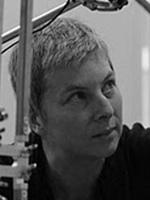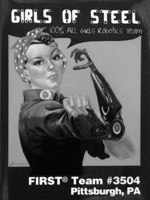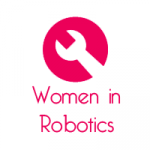
Robohub.org
25 women in robotics you need to know about (2014)

Just last week at the Grace Hopper Celebration of Women in Computing, Microsoft’s CEO Satya Nadella gave women some questionable career advice: “It’s not really about asking for the raise, but knowing and having faith that the system will actually give you the right raises as you go along. Because that’s good karma.” The event moderator, Professor Maria Klawe, president of Harvey Mudd College and a Microsoft director, immediately disagreed with Nadella’s advice, suggesting instead that women do their homework on salary levels and practice asking for pay raises.
Indeed, good karma seems to be slow coming. Women account for only 17% of Microsoft’s management and technical staff. It’s been calculated by the National Women’s Law Center that women still earn only 78c on the dollar compared to their male counterparts. And the consequences of not negotiating a starting salary at the beginning of one’s career can amount to the loss of millions in earnings over a woman’s lifetime.
From Hypatia to Grace Hopper, there have been many amazing women who have carved themselves out a name in the fields of science, engineering, mathematics and technology, despite the lack of financial reward. However, these comparatively few women can easily be lost from the pages of history without an ongoing push to make sure that they are represented; women are still well under 20% of the tech workforce, and role models are important.
And yet there is movement in the right direction: This spring, Harvey Mudd College broke new ground when 56% of its engineering degrees were awarded to women – the first time the college’s women graduates have outnumbered men in this discipline. And this fall, Lynne Parker announced a 50 strong all-female organizing committee for ICRA – one of the premier academic robotics events worldwide.
If Ada Lovelace Day is about sharing stories of women in science, technology, engineering and math to create new role models for girls and women in these male-dominated fields, stories like these can only inspire us to keep pushing.
In celebration we’ve once again created a short list of women in robotics that everyone should know about (see also 25 women in robotics you need to know about (2013)).
Although all the women listed here are doing great things, our list isn’t by any means a ranking. Rather, it is a range: from early stage to emeritus, from many different countries and in a variety of robotics disciplines; researchers, entrepreneurs and academics, innovators, artists and policy makers. In short, here are 25 more reasons why women can do anything. Please share.
25 women in robotics you should know about (in alphabetical order)
| Ruzena Bajcsy | |
 |
Ruzena Bajcsy took the helm at CITRIS in November 2001, after devoting more than 30 years of her life to research in the fields of robotics, artificial intelligence and machine perception. Bajcsy’s credentials reach across the traditionally discrete fields of neuroscience, applied mechanics and computer science. She is a member of both the National Academy of Engineering and the Institute of Medicine, a distinction few people can match. |
| Berkeley | Professor of Electrical Engineering and Computer Sciences | Director of CITRIS |
| Sampriti Bhattacharya | |
 |
Sampriti Bhattacharya is a PhD student at Massachusetts Institute of Technology (MIT) in the department of Mechanical Engineering doing research on underwater robotics for nuclear reactor inspection. Coming from a small college in Kolkata, India, Bhattacharya realized that the opportunities for engineering research and creativity were too limited in her country. This led her to start the Lab-X Foundation to provide hands-on engineering training to those with limited resources, and to bring world class education into developing countries. |
| MIT | PhD Student | Director & Founder of Lab-X Foundation |
| Maren Bennewitz | |
 |
Maren Bennewitz developed several innovative solutions for robotic systems co-existing and interacting with humans. Among them are probabilistic techniques for navigation with humanoid and wheeled robots as well as for reliably detecting and tracking humans from sensor data and analyzing their motions. She is currently PI on EU projects Squirrel and Rovina and the German cluster BrainLinks-BrainTools. |
| University of Freiburg | Juniorprofessorin of Computer Science | Head of Humanoid Robots Lab |
| Ekaterina Bereziy | |
 |
Ekaterina Bereziy graduated from from Moscow State University’s mechanics and mathematics faculty, before founding ExoAtlet, Russia’s first exoskeleton startup. ExoAtlet features maneuverability, brain-to-computer interface and comfort, and the startup has won a spot in the Skolkovo IT cluster, beating 750 other startups. |
| ExoAtlet | Founder & CEO |
| Alicia Casals | |
 |
Alicia Casals is currently leading the research group on Robotics and Medical Imaging program of the Institute for Biomedical Engineering of Catalonia (IBEC), and the research group GRINS: Intelligent Robots and Systems (UPC-IBEC). The research is oriented to improve human robot interaction through multimodal perception, focused mainly in the area of medical robotics. In this field she is working in robotic systems and control strategies for rehabilitation, assistance and surgical applications. In 2001 she was one the founders of the European Robotics Network, Euron, being part of its Board until 2008. In 2004 she created the Spanish Robotics Chapter, which she led until 2006. She was Vice-President of the IEEE Robotics and Automation Society in the period 2008-2009. Among other prizes, she received the Narcís Monturiol Medal of the Generalitat de Catalunya in 1998. |
| Technical University of Catalonia | Full Professor in the Automatic Control and Computer Engineering Dept | Leader of the Robotics Group at IBEC |
| Elaine Chen | |
 |
Elaine Chen is an MIT-trained engineering and product development executive. She has over 20 years of experience building great teams and developing disruptive products with hardware and software components in a startup setting. She has served as a product management and product development executive for several startups at the VP level, including SensAble Technologies (now part of the Geomagic division of 3D Systems), Zeemote, Zeo, and most recently Rethink Robotics, the company that brought the revolutionary Baxter collaborative robot to market. |
| MIT Sloan School of Management | Senior Lecturer | Entrepreneur in Residence at Martin Trust Center for MIT Entrepreneurship | Consultant at Concept Springs |
| Marita Cheng | |
 |
Marita Cheng is currently the founder and CEO of 2Mar Robotics, making robotic arms for people with disabilities. In 2008, while a mechatronics undergraduate at University of Melbourne, Marita founded Robogals, a university club to encourage girls into STEM. Robogals is now a global program of volunteers with branches at 21 universities in 5 countries. Cheng was named Young Australian of the Year in 2012. |
| 2Mar Robotics | Founder & CEO | Founder of Robogals |
| Vanessa Evers | |
 |
Vanessa Evers likes to take theories on human behaviour from social psychology and see if similar processes occur when we interact with technology. Her research focuses on Human Interaction with Autonomous Agents such as robots or machine learning systems and cultural aspects of Human Computer Interaction. Vanessa won the best thesis prize awarded by the Dutch National Society of Registered Information Specialists, was co-author of the James Chen best paper award of the journal on User Modeling and User Adapted Interaction together with her Ph.D. student Henriette Cramer. She is a member of the ACM International Human Robot Interaction Steering Committee and Associate of the Human Robot Interaction Journal. |
| University of Twente | Professor of Computer Science at Human Media Interaction Group |
| Silvia Ferrari | |
 |
Silvia Ferrari’s research aims at providing intelligent control systems with a higher degree of mathematical structure to guide their application and improve reliability. Decision-making processes are automated based on concepts drawn from control theory and the life sciences. Recent efforts have focused on optimal control problems in computational geometry and multiscale dynamical systems aimed at improving the effectiveness of mobile sensor networks, such as, acoustic and demining sensors installed on underwater vehicles and ground robots. New methods for neural network training are also being developed to retain long-term procedural memories, solving partial differential equations online, and training in-vitro and in-silico spiking neural networks to solve complex sensorimotor learning problems. |
| Duke University | Professor of Mechanical Engineering and Materials Science | Director Laboratory for Intelligent Systems and Controls & WISeNet |
| Maria Gini | |
 |
Maria Gini’s research covers multi-robot systems, swarm robotics, behavior-based robots, autonomous agents, multi-agent systems, auctions, distributed planning and decision making. She is the Winner of the Inaugural Distinguished Women Scholars Award, University of Minnesota, 2001, AAAI Fellow, ACM Distinguished Scientist and is the chair of ACM Special Interest Group on Artificial Intelligence (SIGART), a member of the AAAI Executive Council and of the board of the International Foundation of Autonomous Agents and Multi-Agent Systems. Gini is also on numerous editorial boards for journals. |
| University of Minnesota | Morse-Alumni Distinguished Teaching Professor of Computer Science |
| Ayanna Howard | |
 |
Ayanna Howard’s area of research is centered around the concept of humanized intelligence, the process of embedding human cognitive capability into the control path of autonomous systems. This work, which addresses issues of autonomous control as well as aspects of interaction with humans and the surrounding environment, has resulted in more than 130 peer-reviewed publications about a number of projects—from scientific rover navigation in glacier environments and intelligent terrain assessment algorithms for landing on Mars to assistive robots for the home. She was named a top young innovator of 2003 by MIT Technology Review, recognized as Educator of the Year in 2009 by NSBE and received the Georgia Tech Outstanding Interdisciplinary Activities Award in 2013. |
| Georgia Tech | Motorola Foundation Professor of Electrical and Computer Engineering | Director Human-Automation Systems (HumAnS) Laboratory |
| Noriko Kageki | |
 |
Noriko Kageki is the business development manager for Kawada Robotics Corp, makers of Nextage, Japan’s newest two-armed industrial collaborative robot. Nextage is very good at electronics assembly and other tasks in manufacturing facilities, but has potential service applications as well. Noriko’s background is in physics, engineering and science communication. Before joining Kawada, Kageki was a robotics and technology journalist for the Nikkei and founded GetRobo, an online publication focusing on news about robots for the home and community. |
| Kawada Robotics Corp | Business Development Manager |
| Kendra Kerrisk | |
 |
Kendra Kerrisk has contributed significantly to the national and international knowledge regarding application of Automatic Milking Systems with pasture-based dairying. Kerrisk has developed a set of Management Guidelines for Pasture-Based AMS farms, which have been an extremely valuable tool for farmers adopting (and contemplating adopting) AMS across Australia and further abroad. One of the highlights of the work conducted within FutureDairy has been the involvement with the co-development of the world’s first Robotic Rotary (Automatic Milking Rotary, DeLaval AMRTM). This internationally recognised work will increase the feasibility of robotic milking for large dairy herds that are more common within the Australian and New Zealand industries. |
| University of Sydney | Associate Professor of Veterinary Science | Lead Researcher Future Dairy |
| Maarja Kruusma | |
 |
Maarja Kruusma co-founded Intelligent Materials and Systems Lab at the Tartu University of Technology Estonia, focusing on modeling, control and mechanical design of electroactive polymer artificial muscles. In 2008, she founded the Center for Biorobotics in Tallinn University of Technology, which is an interdisciplinary research center for conducting research and development on the borderline of science and technology. Her research interests include biologically-inspired underwater robotics, computational and experimental fluid dynamics, flow sensing, robot learning and adaptation, soft body modeling and control. She is an R&D director of Fits.me, a start-up company using robotics technology for virtual online fitting rooms. She is also a member of ISTAG, an advisory body to the European Commission in the field of Information and Communication Technology, the General Chair of the 15th IEEE International Conference on Advanced Robotics held in Tallinn at 2011 (ICAR 2011) and the coordinator of several EU projects; Fishview, Robocademy, ARROWS, FILOSE, SAFROS, and I-SUR. |
| Taillin University of Technology | Professor | Head of TUT Biorobotics |
| Tessa Lau | |
 |
Tessa Lau is currently at Savioke creating easy-to-use robots for the services industry, like SaviOne. Lau was formerly a research scientist at Willow Garage where she developed simple, usable interfaces to robots. Before that, she was a research staff member and manager at IBM Research, leading the Smarter Web research group within Almaden’s Computer Science department. Her research goal is to develop innovative interfaces for enhancing human productivity and creativity through the use of techniques drawn from human-computer interaction and artificial intelligence. Lau is also on the board of the CRA-W, the CRA’s committee on the status of women in computing research, and has played several organizational roles in the Grace Hopper Celebration of Women in Computing. |
| Savioke | Chief Robot Whisperer |
| Rezia Molfino | |
 |
Rezia Molfino is professor of Robot Mechanics, Industrial and Service Robotics, Automation and Robotics and Control of Mechanical Systems at the University of Genova. Holder of 12 patents and author of hundreds of publications, she has held numerous positions and is among other things responsible for the PMARlab (Laboratory of Design and Measurement for Automation and Robotics), President Siri (Italian Association of Robotics and Automation) Italian coordinator in IFR (International Federation of Robotics). |
| University of Genova | Full Professor of Robotics | Director of the PMARlab Robotics |
| Mihoko Otake | |
 |
Mihoko Otake’s research topics include modeling and simulation of cognitive function of humans and electroactive polymers and their applications to design and control of intelligent systems and services. She has been an Associate Professor with Department of Mechanical Engineering, Graduate School of Engineering, Chiba University, Japan since 2012. She is concurrently the Founding Director of the Fonobono Research Institute (FRI) since 2007. She has been a Principal Investigator of the PRESTO Program of JST from 2010 to present on “Individually Adapted Cognitive Activity Support based on Large Scale Conversation Data”, and since 2004 to 2008 on “Development of Bilateral Multiscale Neural Simulator” respectively. For her contributions in electroactive polymer gel robots, involving beam-shaped gels curling around an object and starfish-shaped gel robots turning over, Otake was awarded the Young Investigator Award from Robotics Society of Japan. |
| Chiba University | University of Tokyo | Associate Professor of Mechanical Engineering | Founding Director NPO Fonobono Research Institute |
| Lea Rosen | |
 |
Lea Rosen is an attorney who specializes in drones and aerial robots, privacy, data security, freedom of expression and the right of anonymity, software licenses and users’ rights, corporate liability for human rights abuses, government liability for unwarranted surveillance, and legal developments around UAS integration into the national airspace. She is a licensed member of the CA state bar. Rosen is also the Head of Research at Freedom of the Press Foundation and Director of Research at DARC. DARC is a multidisciplinary conference about Unmanned Aerial Vehicles (UAVs) and drones—with an emphasis on civilian applications. |
| Attorney | Director of Research | DARC Drones and Aerial Robotics Conference |
| Julie Shah | |
 |
Julie Shah has developed innovative methods for enabling fluid human-robot teamwork in time-critical, safety-critical domains, ranging from manufacturing to surgery to space exploration. She previously worked at Boeing Research and Technology on robotics applications for aerospace manufacturing. Her group draws on expertise in artificial intelligence, human factors, and systems engineering to develop interactive robots that emulate the qualities of effective human team members to improve the efficiency of human-robot teamwork. Shah is the recipient of a 2014 NSF CAREER Award, and her work was recognized by the Technology Review as one of the 10 Breakthrough Technologies of 2013. |
| CSAIL MIT | Boeing Assistant Professor of Aeronautics and Astronautics | Lead of the Interactive Robotics Group |
| Inna Sharf | |
 |
Inna Sharf has addressed numerous problems associated with the development and control of autonomous systems. Her research expertise lies in dynamics and control of robotic, mechatronic and autonomous systems and her focus in the last several years has been specifically in the areas of dynamics and control of small highly maneuverable unmanned (i.e. remotely piloted) aerial vehicles. Sharf has been involved in many collaborative projects with industry, including MDA Inc., Quanser Consulting Inc., CSA, and DRDC, four NCFRN partners, as well as academic partners in the US, Europe and Israel. These collaborations and the work of her research group resulted in numerous publications in leading conferences and journals. Sharf’s work is currently funded by NSERC and FQRNT. |
| McGilll University | Professor of Mechanical Engineering | Cofounder of Aerospace Mechatronics Lab |
| Mari Velonaki | |
 |
Mari Velonaki has worked as a researcher and artist in the field of interactive media since 1995. Velonaki has created interactive installations that incorporate movement, speech, touch, breath, electrostatic charge, artificial vision and robotics. In 2003, Velonaki’s practice expanded to robotics, when she initiated and led a major Australian Research Council art/science research project “Fish-Bird: Autonomous Interactions in a Contemporary Arts Setting” in collaboration with robotics scientists at the Australian Centre for Field Robotics (ACFR, University of Sydney). In 2007, Velonaki was awarded an Australia Council for the Arts Visual Arts Fellowship, and in 2009 she was awarded an ARC Australian Research Fellowship. In 2006, Velonaki co-founded the Centre for Social Robotics (CSR). Velonaki is also the Director of the recently established Creative Robotics Lab (CRL) at NIEA. |
| University of New South Wales | NIEA | Director of CRL, NIEA | CoDirector Centre for Social Robotics, USYD | Adjunct Assoc. Prof. Australian Center for Field Robotics, USYD |
| Barbara Webb | |
 |
Barbara Webb’s main research interest is in perceptual systems for the control of behaviour. The work is largely concerned with building computational and physical models of these mechanisms to explicate and evaluate hypotheses. In particular Webb focuses on insect behaviours, as their smaller nervous systems may be easier to elucidate. Recent work has focussed on some of the more complex capabilities of insects, including multimodal intergration, navigation and learning. She also has an interest in theoretical issues of methodology; in particular the problems of measurement, modeling and simulation. |
| University of Edinburgh | Professor of Biorobotics |
| Holly Yanco | |
 |
Holly Yanco’s research interests include human-robot interaction, better visualization of sensor data, adjustable autonomy, urban search and rescue, assistive technology, and robotics education. Her lab is funded by the National Science Foundation, the Army Research Office, Microsoft and the National Institute of Standards and Technology. She founded the Robotics Lab, which consists of students at all stages of their careers, from freshmen to doctoral candidates. Research focuses on human-robot interaction (HRI), which includes multi-touch computing, interface design, robot autonomy, trust, and evaluation methods. Application domains include assistive technology, telepresence, and urban search and rescue (USAR). Yanco is also the director of the New England Robotics Validation and Experimentation (NERVE) Center. |
| U Mass Lowell | Professor of Computer Science | Director New England Robotics Validation and Experimentation (NERVE) Center |
| Xiaorui Zhu | |
 |
Xiaorui Zhu’s research interests include control and localization of mobile robots, flight control of unmanned helicopter, mechatronics, and medical robotics. In 2012, Zhu won the Award for National Science and Technology of China. |
| Harbin Institute of Technology Shenzhen | Associate Professor | Chair Women in Engineering IEEE RAS |
| Girls of Steel | |
 |
Girls of Steel is an all girl FIRST Robotics Competition team, founded in Pittsburgh in 2010. Initially, the team consisted of 24 girls from 12 different high schools, and 4 different educational options. The team now numbers almost 60 girls, with FIRST LEGO League teams. The Girls of Steel mission is to empower women in STEM, giving girls skills that go beyond building robots and last longer than high school. |
| FIRST Team 3504 | Pittsburgh, PA |
If you liked this article, you may also be interested in:
- 25 women in robotics you need to know about – 2015
- 25 women in robotics you need to know about (2013)
- Mentors of Steel: The role of mentoring in robotics education
- Getting into the driver’s seat: Girls of Steel tell us how they got hooked on robotics
- Robot Launchpad on Robots Podcast
- Jobs isn’t the issue for robotics
See all the latest robotics news on Robohub, or sign up for our weekly newsletter.
tags: Ada Lovelace Day, c-Politics-Law-Society, cx-Events, robohub focus on diversity, women in robotics, women in robotics list, women in STEM






